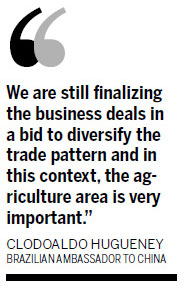Foreign and Military Affairs
New Brazil president to boost ties
By Qin Jize and Ai Yang (China Daily)
Updated: 2011-04-08 09:18
 |
Large Medium Small |
Beijing - Brazil's President Dilma Rousseff will seek more access for Brazilian products in the world's second-largest economy and press for further diversification of its exports during her official visit, said Clodoaldo Hugueney, Brazil's ambassador to China.
Hugueney said the visit is expected to yield concrete results as the two emerging economies have further intensified their trade and investment ties.
"We are still finalizing the business deals in a bid to diversify the trade pattern and in this context, the agriculture area is very important for us with meat and sausages being the new trade sectors," he said.
Brazil is the largest meat exporter in the world and is expecting to export various types of meat to China, Hugueney said.
|
 |
Bilateral trade between China and Brazil has been growing by nearly 45 percent on an annual basis and reached $56 billion last year compared with $9 billion in 2004. China also replaced the United States in 2009 as Brazil's biggest trade partner.
Brazil's exports to China have also grown in tandem and reached $30.7 billion in 2010 compared with $1 billion in 2000.
Most of Brazil's exports to China to date have been mineral resources and soybeans, and it has an estimated annual trade surplus of $5 billion with China.
However, the ambassador feels that it is an opportune time for China to increase its purchase of value-added products from Brazil.
"We are aiming to expand the share of manufacturing in our exports to China, especially aircraft," he said, adding that Brazil is already an important supplier of regional aircraft in the Chinese market.
Earlier this week, Brazilian aircraft manufacturer Embraer said it had joined hands with Minsheng Financial Leasing of the China Minsheng Banking Corporation to promote executive aviation in China and also to secure financing opportunities for Embraer aircraft sales.
Embraer delivered 145 executive jet aircraft in 2010 worldwide and had a market share of 19 percent, indicating that the Brazilian company had produced one out of every five executive aircraft sold last year.
Rousseff, who took office in January this year, is leading a 100-strong business delegation to China to further cement trade ties, especially in the economic and commercial sectors.
Her visit will also coincide with a business seminar that will have active participation from Brazilian businessmen and their Chinese counterparts. The president will also participate in the opening ceremony of a dialogue on science, technology and innovation.
From Beijing, Rousseff will go to Hainan to attend the third summit of the emerging nations, collectively referred to as BRICS (Brazil, Russia, India, China and South Africa), and the Boao Forum for Asia.
Chinese companies have already announced investment plans of nearly $30 billion in Brazil, including $8.6 billion worth of deals currently under negotiation, according to an AFP report quoting a report published ahead of the official visit.
Energy and mining sectors represented 90 percent of those investments, said the report conducted by the Brazil-China Business Council.
Last year, China made several purchases in Brazil including iron ore mines and electricity grids.
Experts said that the current Chinese investment in Latin America is targeted at countries that have rich resources, huge market potential and tax advantages. Future Chinese investments in Brazil should however be focused on infrastructure construction and manufacturing, they said.
| 分享按钮 |



